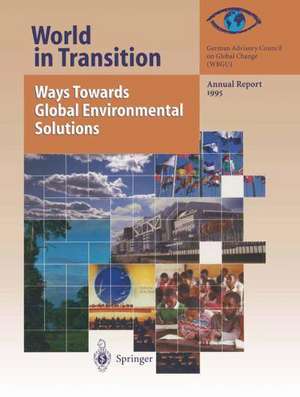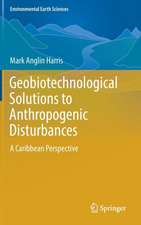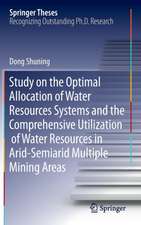World in Transition: Ways Towards Global Environmental Solutions: Annual Report 1995: World in Transition, cartea 1995
Autor German Advisory Council on Global change (WBGU)en Limba Engleză Paperback – 29 mar 2012
Preț: 311.41 lei
Nou
Puncte Express: 467
Preț estimativ în valută:
59.59€ • 62.37$ • 49.60£
59.59€ • 62.37$ • 49.60£
Carte disponibilă
Livrare economică 10-24 martie
Preluare comenzi: 021 569.72.76
Specificații
ISBN-13: 9783642801822
ISBN-10: 364280182X
Pagini: 252
Ilustrații: XVI, 236 p. 36 illus. in color.
Dimensiuni: 210 x 279 x 13 mm
Greutate: 0.58 kg
Ediția:Softcover reprint of the original 1st ed. 1996
Editura: Springer Berlin, Heidelberg
Colecția Springer
Seria World in Transition
Locul publicării:Berlin, Heidelberg, Germany
ISBN-10: 364280182X
Pagini: 252
Ilustrații: XVI, 236 p. 36 illus. in color.
Dimensiuni: 210 x 279 x 13 mm
Greutate: 0.58 kg
Ediția:Softcover reprint of the original 1st ed. 1996
Editura: Springer Berlin, Heidelberg
Colecția Springer
Seria World in Transition
Locul publicării:Berlin, Heidelberg, Germany
Public țintă
Popular/generalCuprins
Summary.- Summary.- A Introduction.- A Introduction.- B Societal Conditions for Solving Global Environmental Problems.- 1 Environmental Awareness and Environmental Education.- 2 Exchange of Know-how and Technology Transfer.- 3 Institutions and Organizations.- 4 Growth and Distribution of the World’s Population.- C International Conventions Aimed at Solving Global Environmental Problems.- 1 The Framework Convention on Climate Change — Berlin and its Aftermath.- 2 The Montreal Protocol -An Example for Successful Environmental Policy.- 3 The Convention on the Law of the Sea -Towards the Global Protection of the Seas.- 4 The Desertification Convention -A First Step Towards the Protection of Soils.- 5 The Biodiversity Convention — The Implementation Is Yet to Come.- 6 Protection of Forests: Protocol or Convention?.- 7 The GATT/WTO Regime — The Greening of World Trade.- D General Conclusions and Recommendations.- D General Conclusions and Recommendations.- E Annex: Notes on the Inverse Scenario in Section C 1.3.- E Annex: Notes on the Inverse Scenario in Section C 1.3.- F References.- F References.- G The Council.- G The Council.
Recenzii
"...compulsory reading for everyone who, either professionally or form a purely intellectual interest, seeks information about transboundary environmental issues from an interdisciplinary point of view" Int. Jnl. of Environmental and Pollution
Textul de pe ultima copertă
At the first Conference of the Parties of the Climate Convention in Berlin in Spring 1995 it became evident once again: To counteract anthropogenic climate changes, individuals as well as societies have to change their way of thinking and behavior. This accounts for other areas of global environmental change as well. Global trends like soil degradation, loss of biological diversity, water scarcity and population growth show little or no sign of improvement. In fact, in most areas a rapid deterioration has taken place. In its latest Report the German Advisory Council on Global Change describes "Ways Towards Global Environmental Solutions". In many areas of global change definite solutions are not at sight. However, dedicated and immediate action could, in principle, avert irreversible or disastrous damage to the global environment. Whether these steps will actually be taken will be seen in the future, since substantial efforts and significant reorientations at the local, national, and global level are necessary. Two aspects have to be considered: on the one hand, at the societal level, the prerequisites for solving global environmental problems have to be improved. These measures present a challenge to nations and societies as a whole, where nongovernmental organizations could also play an important role. On the other hand, at the governmental level, international agreements must be formulated or intensified and enforced by suitable measures.
























